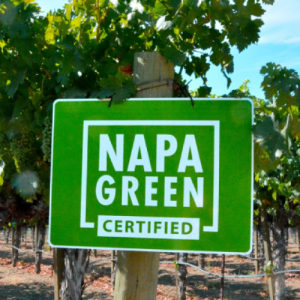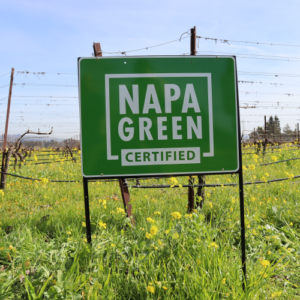Napa Green to Phase Out Glyphosate-Based Herbicides By 2026
In Napa, the country’s highest-priced wine region, the sustainability group Napa Green announced it is becoming “the first sustainable winegrowing certification globally to require the phaseout of Roundup and ultimately synthetic herbicides,” the group said in a press release.
The move comes as a result of soil health, community health and consumer concerns, its leaders said.
On the soil health front, Anna Britain, Napa Green’s executive director, said synthetic herbicides ran counter to promoting terroir-driven wines. “…[soil] diversity increases resilience, and [synthetic] herbicides reduce diversity. So, the herbicides are reducing the health of the fungal and microbial networks that are deeply tied to the functioning and the health of the plants above ground.”
Napa Green’s Vineyard Program Manager Ben Mackie and Britain pointed to scientific findings that herbicides reduce the fungal and microbial networks in the soil and that soil diversity increases resilience.
Public Influence
In addition to soil health, other factors played a part in the decision. These included consumer opinions, media inquiries and community health issues.
On its website, Napa Green wrote, “Roundup has dramatically risen in public awareness and concern due to IARC’s carcinogen finding, lawsuits against Bayer (the manufacturer of Roundup), tests showing glyphosate residues in food and beverages… and concerns about Monarch butterfly and honeybee decline.” IARC stands for the International Agency for Research on Cancer and is part of the World Health Organization of the United Nations.
The group went on to say, “Regionally, we’ve seen increased concern about wine industry Roundup use with the release of the documentary, ‘Children of the Vine.’”
The film was made by a local documentarian, Brian Lila, and has been seen in dozens of community screenings in northern California and elsewhere. It focuses primarily on the widespread use of glyphosate-based herbicides on commodity crops and the health issues associated with that.
In wine, the film features two local wine producers with certified-organic vineyards who don’t use synthetic herbicides, Ted Lemon of Littorai in Sonoma and Frank Leeds of Frog’s Leap in Napa, who say opting out of Roundup is not hard.
In a public talk, Lilla shared a group of teenagers in St. Helena found out their high school grounds were being sprayed with Roundup. “They went to the school board, and long story short, they now ban it throughout the entire school district,” he said.
According to Napa Green’s website, this is not an isolated occurrence.
The website’s FAQs section says, “More than 45 cities and counties in California have banned the use of Roundup on city-/county-owned property and/or school campuses.”
Focus on Sustainability
Britain stressed Napa Green’s sustainability program is about evolving. “Sustainability is a path, not a destination. We always have to continuously grow and evolve. And I think this is a critical next step in our leadership.”
“About 64% of our members and transitioning members don’t use synthetic herbicides already,” she said.
Meanwhile, Napa Valley Grape Growers has also taken an interest in weed control and glyphosate alternatives. Its latest Rootstock conference released data in November showing Roundup use had halved since 2018, and public data shows glufosinate ammonium acreage rose 28% from 2017 to 2021, increasing from 7,596 acres in 2017 to 9,731 acres in 2021 as growers tried to avoid saying they used Roundup.
“The only cons are that we do anticipate we’re going to lose some members, probably some of the members that are in transition but haven’t finished the certification process yet,” Britain said. “But, on the other hand, it is a phaseout. We did intentionally create a realistic timeline to work with growers to make this transition.”
While it will appeal to certain segments of the grower community and the wine market, the move will alienate some, Britain said.
“Sadly, the sword a lot of people are willing to die on is, ‘You are not taking my tools out of my toolkit. You are not taking my herbicides out of my toolkit.’ I don’t want to speak for them. But I think there’s various approaches.
“We’re trying to work with members on any number of issues.”
Said Britain, “It’s hard to keep talking about leading regenerative soil health practices and terroir, this idea that grapes are an expression of place, if we’re undermining the soils that those vines and grapes are coming from,” Brittain said. “There’s been more consumer demand and media demand putting growing attention on this issue, and we recognized that allowing Roundup and other synthetic herbicides go against our focus on soil health.”
Members must phase out Roundup and glyphosate-based herbicides by Jan. 1, 2026 and other synthetic herbicides including Lifelink (which contains glufosinate ammonium) by Jan. 1, 2028.
In the press release, Andy Erickson, board chair of the Napa Valley Vintners, said, “I see this as an important step for Napa Valley. It makes perfect sense that our valley and community should be on the forefront of eliminating these herbicides and moving in a more sustainable direction.”
Making the commitment to third party certification takes time and effort, but it is worth it to demonstrate our commitment to the community and to protect our watershed, our land and the air we breathe.
- Susan Boswell, Chateau Boswell Winery


